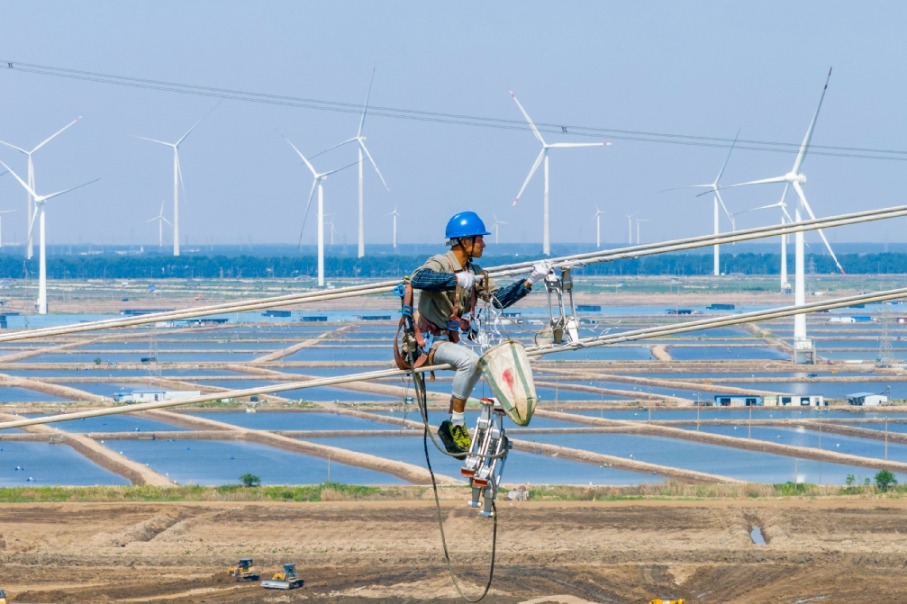Learning and earning

Rising demand, positive investors and technology brighten prospects for online education companies
In October last year, Shanghai resident Song Yujiao, 34, a procurement manager at a pharmaceutical company and mother of You Zhenyu, 4, decided to do what millions of others like her have been doing of late: She booked an expensive cross-border online education course for her child.
Initially, she was skeptical about whether the English-language program would be effective. The teacher, Matthew Privette, 27, was based thousands of miles away in the US state of South Carolina. The online course, offered by VIPkid, is received on Song's laptop.
Would a mix of livestreaming 25 minutes a day, and offline videos on her 15-inch screen, keep her son engrossed even for five minutes? When she was away for work, would he learn without supervision? She used to wonder, but not anymore. Her son no longer acts up, either.
He can't wait to flaunt his Halloween costume to his English teacher on-screen. He wants to learn the language even on holidays.
"I travel often. Unlike other parents, I hardly have the time to pick up my son from classes. So the online class saves a lot of trouble. I can also check the quality of the class using the replay feature of the video format," Song says.
For young Chinese parents such as Song, technology in the form of cross-border online educational services is proving to be a blessing.
According to the China Internet Network Information Center, 144 million Chinese used such services by the end of June, including 6.62 million who registered this year.
The rapidly growing segment has three streams: the K12 education system that children from kindergarten age to 12 years old can pursue; vocational education; and language education.
The market in China for such online education is growing by 20 percent each year. Last year, revenue reached 156 billion yuan ($23.5 billion; 20.2 billion euros; £17.9 billion), according to the Beijing-based market consultancy iResearch.
With that kind of momentum, and given many Chinese parents' ample budgets for children's education, total market value is expected to reach 269.3 billion yuan in 2019.
According to HSBC's 2017 Global Education Survey, Chinese parents on average spend $42,892 on their children's education over 12 years - from primary school to high school - which is much higher than the amount parents spend in Australia, the United Kingdom and France.
Chinese parents also have the richest educational reserve, since 55 percent of them pay their children's education fees from savings, investments or insurance returns.
Despite a downtrend this year, investors are sustaining financial backing for ventures that offer online education.
According to iResearch, 83 rounds of funding were recorded in the online education market during the first five months of 2017, which brought in 4.95 billion yuan, down by 39 percent year-on-year. That compares with 176 rounds in the first five months of last year.
The full-year figure for 2017 is expected to be lower than the 519 rounds of funding in 2015.
Du Miaomiao, senior analyst with iResearch, says: "The market has witnessed much investment over the past three years. Now the investment bubble has been squeezed out. Investors have become more conservative."
But mergers and strategic investments have soared in the first five months, with 6 percent of funding coming from mergers and an additional 9.6 percent from strategic investments, up from 2.9 percent and 2.3 percent year-on-year, respectively.
"This shows that the market is consolidating after heavy investments over the past three years," says Du. "Industry leaders have started to extend their product lines via mergers. They are also integrating the value chain by making strategic investments in other companies."
Vocational education has registered a high of 37.8 percent annual growth in terms of funding received so far this year. Du says it is mainly because of the large number of users and their increasing willingness to learn and pay for what they are taught.
For instance, Su Bo, 32, has been working in a property company in Nantong, Jiangsu province, for seven years. In September, he registered for an online course in engineer supervision in the hope of qualifying for a job promotion and raise.
"Online courses make it possible for working staff like me to study during our spare time via livestreaming and offline videos," he says.
Du of iResearch says: "Interactive livestreaming is now widely accepted in online education."
With the advancement in artificial intelligence, online education will see more room for development, she says. For example, virtual teachers and automated yet interactive programs might become the order of the day.
Yu Minhong, CEO of New Oriental Education and Technology Group, said at a forum in early October in Beijing that one-third of AI applications in the future will be in education.
"Education will be one of the fastest-growing industries and worthy of investment in this age of AI," he said.
A number of Chinese companies have already started mapping their future moves in the AI-backed education sector, including Shanghai-based Yixue Education Technology and leading Chinese AI voice technology supplier iFlytek, which is based in Hefei, Anhui province.
It's not roses all the way, though. Challenges are beginning to cause concern about the market.
For one, finding an adequate number of qualified teachers is not easy. The Ministry of Education forbids teachers working at primary schools and middle schools from offering paid lectures after school hours. For another, there are no well-defined regulations in place yet.
Cost is another major challenge. According to He Qiang, founder of online tutorial service provider Sanhao.com, a large number of online education companies face a high cost of acquiring a customer, which is between 3,000 and 10,000 yuan.
"If such companies cannot control the quality of their classroom, they won't be able to recover their cost for a very long time," he says.
shijing@chinadaily.com.cn

(China Daily European Weekly 11/17/2017 page26)
Today's Top News
- Xi calls for upholding of ethnic unity
- Abuse of 'security' stifles innovation, collaboration
- Beijing warns countries against signing trade deals with US that hurt Chinese interests
- AI shouldn't undermine humanity's progress
- Xi urges villagers in Xizang to uphold ethnic solidarity
- Digital tax sparks breakdown in US-Canada trade talks






























